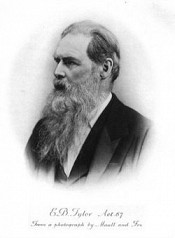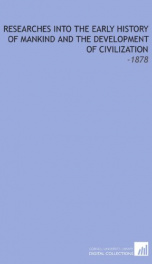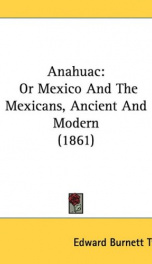Tylor Edward Burnett

Sir Edward Burnett Tylor (2 October 1832 – 2 January 1917), was an English anthropologist. Tylor is considered representative of cultural evolutionism. In his works Primitive culture and Anthropology, he defined the context of scientific study of anthropology, based on the evolutionary theories of Charles Lyell. He believed that there was a functional basis for the development of society and religion, which he determined was universal. E. B. Tylor is considered by many a founding figure of the science of social anthropology, and his scholarly works are seen as important and lasting contributions to the discipline of Anthropology that was beginning to take shape in the 19th century[1]. He believed that research into the history and prehistory of man could be used as a basis for the reform of British society.[2] He reintroduced the term animism (the faith in the individual soul or anima of all things, and natural manifestations) into common use.[3] He considered animism as the first phase of development of religions. E. B. Tylor was born in 1832, in Camberwell, London. He was the son of Joseph Tylor and Harriet Skipper, part of a family of financially well-off Quakers, owners of a London brass factory. He was educated at Grove House School, Tottenham, but due to the death of Tylor's parents during his early adulthood and his restrictive Quaker background, he never gained a university degree.[4] After his parents’ death, he readied himself to help manage the family business, but this plan was abruptly set aside by symptoms consistent with the onset of tuberculosis. Following advice to spend time in warmer climes, Tylor left England in 1855, traveling to Central America. The experience proved to be an important and formative one, sparking in Tylor a lifelong interest in studying unfamiliar cultures. During his travels Tylor also met Henry Christy, a fellow Quaker, ethnologist and archaeologist. Tylor's association with Christy greatly stimulated his awakening interest in anthropology, and helped broaden his inquiries to include prehistoric studies[5]. Tylor’s first publication was a result of his 1856 trip to Mexico with Christy. The notes Tylor took on the beliefs and practices of the people he encountered, allowed him to publish Anahuac: Or Mexico and the Mexicans, Ancient and Modern (1861) upon his return to England. While never traveling again Tylor continued to study the customs and beliefs of tribal communities, both existing and prehistoric (based on archaeological finds) and published his second work, Researches into the Early History of Mankind and the Development of Civilization, in 1865. Following this came his most influential work, Primitive Culture (1871). Despite continuing to work and write all the way up to the beginnings of World War I, Primitive Culture remained the pinnacle of Tylor's career, important not only for its thorough study of human civilization and contributions to the emergent field of anthropology, but for its undeniable influence on a handful of young scholars, such as J. G. Frazer, who were to become Tylor's disciples and contribute greatly to the scientific study of anthropology in later years. In 1871 Tylor was elected Fellow of the Royal Society, and in 1875 received the honorary degree of Doctor of Civil Laws from the University of Oxford. He was appointed Keeper of the University Museum at Oxford in 1883, and, as well as serving as a lecturer, held the title of the first “Reader in Anthropology” from 1884-1895. In 1896 he became the first Professor of Anthropology at Oxford and he was knighted in 1912. Tylor’s ideology is best described in his most famous work, the two-volume Primitive Culture. The first volume, The Origins of Culture, deals with various aspects of ethnography including social evolution, linguistics, and myth. The second volume, titled Religion in Primitive Culture, deals mainly with his interpretation of animism. On the first page of Primitive Culture, Tylor provides an all-inclusive definition which is one of his most widely recognized contributions to anthropology: “Culture, or civilization, taken in its broad, ethnographic sense, is that complex whole which includes knowledge, belief, art, morals, law, custom, and any other capabilities and habits acquired by man as a member of society.”[6] Unlike many of his predecessors and contemporaries, Tylor asserted that the human mind and its capabilities are the same globally, irrespective of a particular society’s stage in social evolution.[7] This essentially means that a hunter-gatherer society would possess the same amount of intelligence as an advanced industrial society. The difference, Tylor asserts, is education, that knowledge and methodology that takes thousands of years to acquire. This is why Tylor often likens primitive cultures to “children”, and why he constantly sees culture and the mind of humans as progressive. Part of the reason he wrote it was to refute the theory of degeneration that was popular at the time. [8] At the end of Primitive Culture, Tylor asserts that “The science of culture is essentially a reformers' science.”[9] Another term ascribed to Tylor was his theory of “survivals.” Tylor asserted that when a society evolves, certain customs are retained that are unnecessary in the new society, like outworn and useless “baggage”.[10] His definition of survivals are “processes, customs, and opinions, and so forth, which have been carried on by force of habit into a new state of society different from that in which they had their original home, and they thus remain as proofs and examples of an older condition of culture out of which a newer has been evolved.”[11] This can include outdated practices, such as the phenomenon of European bloodletting, which lasted long after the medical practices on which it was based had faded from use and been replaced by more modern techniques.[12] Despite much criticism about his survivals (critics argued that he identified the term but provided an insufficient reason as to why survivals actually survive), his originality in coining the term is still acknowledged. Joan Leopold, 1980. Culture in Comparative and Evolutionary Perspective: E. B. Tylor and the Making of Primitive Culture. Berlin: Dietrich Reimer Verlag (in English)
do you like this author?
What readers are saying
What do you think? Write your own comment on this book!
write a commentWhat readers are saying
What do you think? Write your own comment on this author!
write a commentBook list

researches into the early history of mankind and the development of civilization
Series:
Unknown
Year:
Unknown
Raiting:
4/5
Originally published in 1878. This volume from the Cornell University Library's print collections was scanned on an APT BookScan and converted to JPG 2000 format by Kirtas Technologies. All titles scanned cover to cover and pages may include marks notations and other marginalia present in the original volume.
Show more
add to favoritesadd In favorites

anthropology an introduction to the study of man and civilization
Series:
Unknown
Year:
Unknown
Raiting:
3.5/5
Show more
add to favoritesadd In favorites

Anahuac : or, Mexico and the Mexicans, Ancient and Modern
Series:
Unknown
Year:
Unknown
Raiting:
3/5
The journey and excursions in Mexico which have originated the narrative and remarks contained in this volume were made in the months of March, April, May, and June of 1856, for the most part on horseback. The author and his fellow-traveller enjoyed many advantageous opportunities of studying the country, the people, and the antiquities of Mexico, owing to the friendly assistance and hospitality which they received there. --This text refers to an alternate Paperback edition.
Show more
add to favoritesadd In favorites
Book list

researches into the early history of mankind and the development of civilization
Series:
Unknown
Year:
Unknown
Raiting:
4/5
Originally published in 1878. This volume from the Cornell University Library's print collections was scanned on an APT BookScan and converted to JPG 2000 format by Kirtas Technologies. All titles scanned cover to cover and pages may include marks notations and other marginalia present in the original volume.
Show more
add to favoritesadd In favorites

anthropology an introduction to the study of man and civilization
Series:
Unknown
Year:
Unknown
Raiting:
3.5/5
Show more
add to favoritesadd In favorites

Anahuac : or, Mexico and the Mexicans, Ancient and Modern
Series:
Unknown
Year:
Unknown
Raiting:
3/5
The journey and excursions in Mexico which have originated the narrative and remarks contained in this volume were made in the months of March, April, May, and June of 1856, for the most part on horseback. The author and his fellow-traveller enjoyed many advantageous opportunities of studying the country, the people, and the antiquities of Mexico, owing to the friendly assistance and hospitality which they received there. --This text refers to an alternate Paperback edition.
Show more
add to favoritesadd In favorites
What readers are saying
What do you think? Write your own comment on this author!
write a commentif you like Tylor Edward Burnett try:
readers also enjoyed
What readers are saying
What do you think? Write your own comment on this author!
write a commentGenre
if you like Tylor Edward Burnett try:
readers also enjoyed
Do you want to exchange books? It’s EASY!
Get registered and find other users who want to give their favourite books to good hands!

